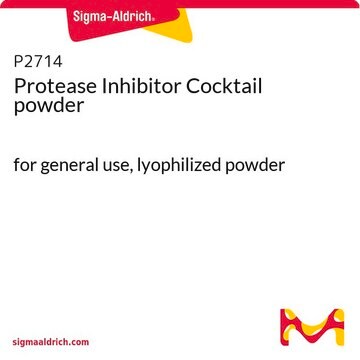52332
Phenylmethylsulfonyl Fluoride
Phenylmethylsulfonyl Fluoride, CAS 329-98-6, is an irreversible inhibitor of serine proteases. It causes sulfonylation of the active-site serine residues.
Synonym(s):
Phenylmethylsulfonyl Fluoride, Benzylsulfonyl Fluoride, PMSF
About This Item
Recommended Products
Quality Level
Assay
≥99% (GC)
form
crystalline solid
manufacturer/tradename
Calbiochem®
storage condition
OK to freeze
desiccated
color
white to off-white
solubility
ethanol: soluble
isopropanol: soluble
methanol: soluble
shipped in
ambient
storage temp.
10-30°C
InChI
1S/C7H7FO2S/c8-11(9,10)6-7-4-2-1-3-5-7/h1-5H,6H2
InChI key
YBYRMVIVWMBXKQ-UHFFFAOYSA-N
General description
Biochem/physiol Actions
serine proteases
Warning
Reconstitution
Other Notes
Weaver, V.M., et al. 1993. Biochem. Cell. Biol.71, 488.
Bourgain, R.H., et al. 1992. Adv. Exp. Med. Biol.316, 427.
Chang, C.T., et al. 1992. Biochem. Int.28, 707.
Legal Information
Signal Word
Danger
Hazard Statements
Precautionary Statements
Hazard Classifications
Acute Tox. 3 Oral - Skin Corr. 1B
Storage Class Code
6.1A - Combustible acute toxic Cat. 1 and 2 / very toxic hazardous materials
WGK
WGK 3
Flash Point(F)
Not applicable
Flash Point(C)
Not applicable
Certificates of Analysis (COA)
Search for Certificates of Analysis (COA) by entering the products Lot/Batch Number. Lot and Batch Numbers can be found on a product’s label following the words ‘Lot’ or ‘Batch’.
Already Own This Product?
Find documentation for the products that you have recently purchased in the Document Library.
Customers Also Viewed
Our team of scientists has experience in all areas of research including Life Science, Material Science, Chemical Synthesis, Chromatography, Analytical and many others.
Contact Technical Service














